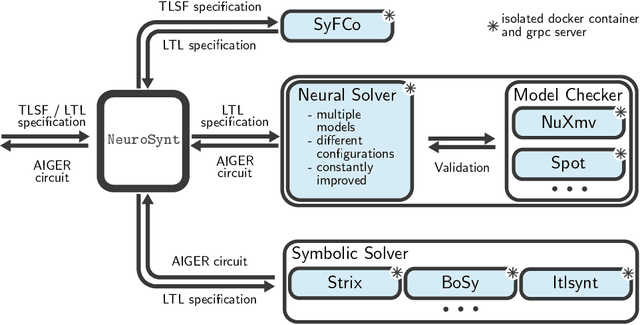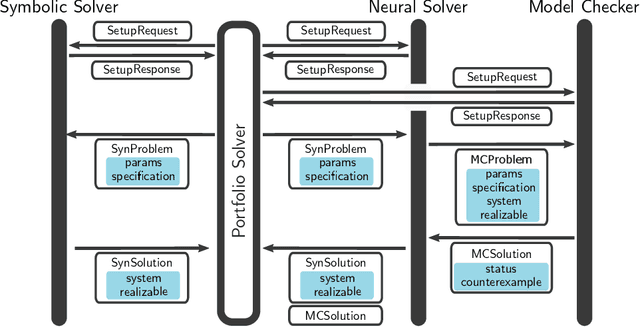Matthias Cosler
Learning Representations Through Contrastive Neural Model Checking
Oct 02, 2025Abstract:Model checking is a key technique for verifying safety-critical systems against formal specifications, where recent applications of deep learning have shown promise. However, while ubiquitous for vision and language domains, representation learning remains underexplored in formal verification. We introduce Contrastive Neural Model Checking (CNML), a novel method that leverages the model checking task as a guiding signal for learning aligned representations. CNML jointly embeds logical specifications and systems into a shared latent space through a self-supervised contrastive objective. On industry-inspired retrieval tasks, CNML considerably outperforms both algorithmic and neural baselines in cross-modal and intra-modal settings.We further show that the learned representations effectively transfer to downstream tasks and generalize to more complex formulas. These findings demonstrate that model checking can serve as an objective for learning representations for formal languages.
NeuroSynt: A Neuro-symbolic Portfolio Solver for Reactive Synthesis
Jan 29, 2024



Abstract:We introduce NeuroSynt, a neuro-symbolic portfolio solver framework for reactive synthesis. At the core of the solver lies a seamless integration of neural and symbolic approaches to solving the reactive synthesis problem. To ensure soundness, the neural engine is coupled with model checkers verifying the predictions of the underlying neural models. The open-source implementation of NeuroSynt provides an integration framework for reactive synthesis in which new neural and state-of-the-art symbolic approaches can be seamlessly integrated. Extensive experiments demonstrate its efficacy in handling challenging specifications, enhancing the state-of-the-art reactive synthesis solvers, with NeuroSynt contributing novel solves in the current SYNTCOMP benchmarks.
nl2spec: Interactively Translating Unstructured Natural Language to Temporal Logics with Large Language Models
Mar 08, 2023Abstract:A rigorous formalization of desired system requirements is indispensable when performing any verification task. This often limits the application of verification techniques, as writing formal specifications is an error-prone and time-consuming manual task. To facilitate this, we present nl2spec, a framework for applying Large Language Models (LLMs) to derive formal specifications (in temporal logics) from unstructured natural language. In particular, we introduce a new methodology to detect and resolve the inherent ambiguity of system requirements in natural language: we utilize LLMs to map subformulas of the formalization back to the corresponding natural language fragments of the input. Users iteratively add, delete, and edit these sub-translations to amend erroneous formalizations, which is easier than manually redrafting the entire formalization. The framework is agnostic to specific application domains and can be extended to similar specification languages and new neural models. We perform a user study to obtain a challenging dataset, which we use to run experiments on the quality of translations. We provide an open-source implementation, including a web-based frontend.
Iterative Circuit Repair Against Formal Specifications
Mar 02, 2023



Abstract:We present a deep learning approach for repairing sequential circuits against formal specifications given in linear-time temporal logic (LTL). Given a defective circuit and its formal specification, we train Transformer models to output circuits that satisfy the corresponding specification. We propose a separated hierarchical Transformer for multimodal representation learning of the formal specification and the circuit. We introduce a data generation algorithm that enables generalization to more complex specifications and out-of-distribution datasets. In addition, our proposed repair mechanism significantly improves the automated synthesis of circuits from LTL specifications with Transformers. It improves the state-of-the-art by $6.8$ percentage points on held-out instances and $11.8$ percentage points on an out-of-distribution dataset from the annual reactive synthesis competition.
 Add to Chrome
Add to Chrome Add to Firefox
Add to Firefox Add to Edge
Add to Edge